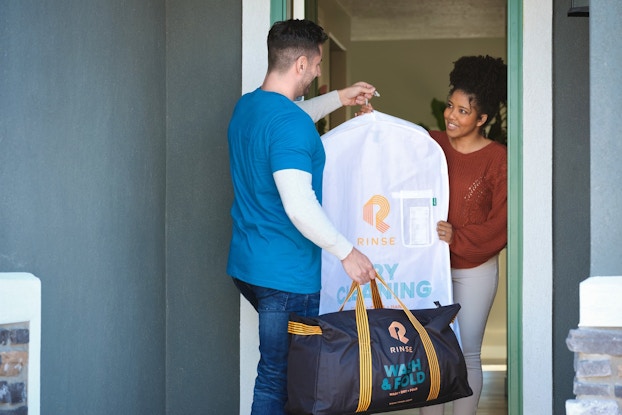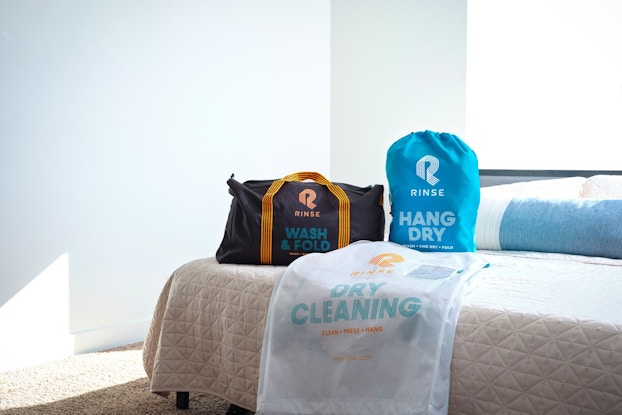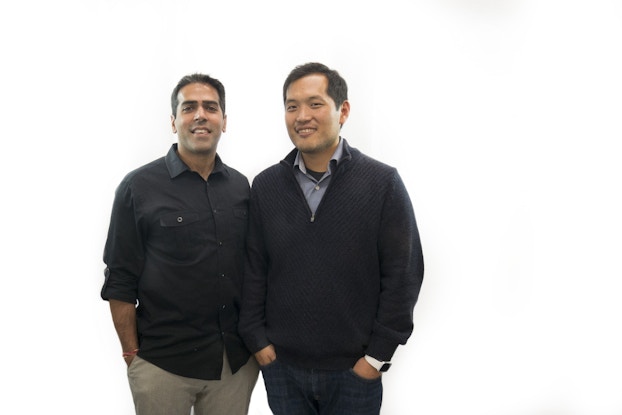
Why it matters:
- Customers face multiple pain points when doing laundry, like inflexible laundromat hours and lack of transparency around delivery times.
- At the same time, local brick-and-mortar cleaners have struggled amid rising property rents.
- Laundry and dry cleaning pickup and delivery app Rinse offers consumers on-demand service by partnering with small business cleaners across the country, seeking to bring newfound convenience to the chore, while offering local laundromats a new revenue stream.
Few people like the regular chore of laundry. But if you live in a big metropolis, keeping clothes clean can be a major inconvenience that’s full of obstacles and frustrations.
Often, it’s tricky to find a time to drop off dirty clothes when laundromats are open only during traditional business hours. It’s unclear when laundry will be ready, and it’s difficult to find a good time to pick it up. Dirty clothes can easily accumulate.
College friends and business school graduates Ajay Prakash and James Joun understood these barriers well. Joun, in particular, had an inside view into the laundry industry, having grown up at his family’s dry cleaning facility in San Francisco.
Prakash, for his part, lived for a period in Manhattan, where getting laundry done can be a hassle. In 2013, Prakash left a role at a travel-related startup and was ready for a new challenge. He wanted to start a business that would bring new technologies to a traditional, established industry and remove friction for customers.
Now, Prakash and Joun are the co-founders of Rinse, a San Francisco-based on-demand laundry and dry cleaning pickup and delivery app. Rinse is helping to streamline and improve how customers get their laundry done by partnering with local brick-and-mortar cleaners across the country, rather than driving them out of business, its founders said.
Over the past two years, Rinse has expanded its footprint by more than 50% into markets including Seattle, Austin, and Dallas. Now, the company’s focus as it expands into several more metro areas in the U.S. this year is simple: clean clothes and deliver excellent technology-enabled customer service.
“There are a lot of really good cleaners out there,” Prakash said. “We let them do what they do best, clean clothes, while we manage customer acquisition, deploy technology to cleaning partners, and help them to grow their business.”
Rinse is part of the global dry cleaning and laundry services market, valued at $104.2 billon in 2021 and projected to reach $145.8 billion by 2031.

Bringing a technology-driven, customer-centric approach to the laundry business
In early 2013, Prakash and Joun started to have regular brainstorming sessions during which they exchanged business ideas and gave each other feedback.
During one chat, Joun shared how his parents’ store had become less busy over the last several years. He was mulling over how to help his family. “All the bells went off for me,” said Prakash. “This was an old-school industry with a lot of customer friction.”
The idea for a business involving laundry started to take shape. Prakash and Joun asked a dozen friends if they could pick up their laundry, take it to Joun’s parents to clean, and then return the clothes to them. The exercise was seamless, and the friends were happy.
“We knew there was something there,” Prakash says.
They conducted interviews to learn about peoples’ frustrations with getting laundry done. A common theme was not having a trusted brand—many customers just used the closest service. People also lamented a lack of transparency and accountability.
“Our thought was, we can create this seamless experience from start to finish, leveraging technology and a customer-centric approach,” said Prakash. They also envisioned a business model that would help mom-and-pop cleaners struggling with rising rents.
In 2013, the two launched Rinse. Customers sign up with Rinse, then use the app to choose a pickup time for their dirty laundry. Rinse valets, who work as W-2 employees (so employee taxes are covered), pick up the laundry during an 8 p.m. to 10 p.m. time slot, then take it to a trusted Rinse cleaning partner. Rinse delivers the clean laundry to customers’ doorstep the next day.
“The goal is that it’s really easy for consumers,” Prakash said. “They should never see anybody except our valet.”
[Read: Meta, Google, and Shopify Execs on How New AI Tools Will Drive Sales in 2024]
There are a lot of really good cleaners out there. We let them do what they do best, clean clothes, while we manage customer acquisition, deploy technology to cleaning partners, and help them to grow their business.Ajay Prakash, Co-founder, Rinse
Rinse: Sending local cleaners a steady stream of business and a sales lift
For cleaners, Rinse fills unrealized capacity. Often, cleaners have a spike in demand at the start of the week, and then business peters out. “It’s impossible to grow that way,” said Prakash. Rinse sends local cleaners a predictable steady stream of business seven days a week, helping them to raise revenue.
Cleaners don’t interact with customers, freeing them up to do what they do best: clean clothes.
Rinse developed a five-step process for working with its cleaner partners that includes ensuring cleaners hire the best possible employees. “It’s also really important that the cleaner wants to grow,” Prakash said.
Both customers and cleaning partners benefit from Rinse’s simple scheduling technology — clients easily book a pickup slot and can keep track of their laundry while cleaners monitor their business more efficiently. Using technology, Rinse also analyzes cleaners’ data, helping them to adjust and grow their business.
“We help them think about staffing, how to cut costs, and to think about their P&Ls—strengths that aren’t necessarily standard in that world,” Prakash said.
On average, a cleaning partner during their first year with Rinse sees a 20% increase in revenue, while dry cleaning partners experience a 10% increase.
[Read: 4 Trend-Driven Ways Brands Are Tapping Personalization for Growth]

Scaling slowly: Angling to be the first national brand in the laundry space ‘and a household name’
Rinse started out with three zip codes in San Francisco. Now, it’s cleaned around 100 million items of clothing and it’s operating across a dozen metro areas in the U.S. It launched in Manhattan, its fastest growing market, in 2022. “Our goal is to be the first national brand in the space and a household name,” Prakash said.
Rinse cleaning partners say they’ve benefitted from the extra income and employee retention. One cleaner was able to fund plant improvements and pay for a Thanksgiving dinner and bonus for its employees because of Rinse.
Over the years, Rinse has grown by slowly and methodically making acquisitions. Over the last ten years, it’s acquired seven companies, mostly startups in the laundry space like Washio in 2016 and most recently Room Service Laundry last year. Rinse acquires competitors’ customer lists.
Scaling up in the industry is difficult and it presents barriers given the layers of operational complexity in cleaning, Prakash said. It’s taken patience. Rinse takes a tortoise approach, he said, focusing on metrics and delivering true value to customers rather than on “the flash,” like a fancy, expensive-to-make app.
At first, laundry pick-up was only available on Sundays. It took several years of honing the Rinse process and procedures to confidently build up to seven days, he said.
“It was about being methodical and creating an amazing customer experience as we scaled,” Prakash said. “We leveraged existing infrastructure in markets and always treat our partners with respect as we fulfill our product promise: clean clothes delivered.”
Small business partners log 70% year-over-year growth
Now, new Rinse customers are growing more than 70% year-over-year. The coming year brings expansion plans. Prakash and Joun have their sights set on opening in five to ten other major metropolitan areas, possibly including Miami, Atlanta, Denver, and Philadelphia. Expanding internationally is on Rinse’s radar for the long term.
At the same time, Rinse is focused on giving back and supporting the communities it operates in. It accepts clothing donations, and around the holidays collects gently used coats, cleaning them before they’re passed on to a new owner. This past holiday season Rinse partnered with New York Cares.
It’s grounded in sustainability, too. Rinse is committed to reusing hangers and plastic bags and not using harmful chemicals to clean.
In 2024, Prakash and Joun will also investigate purchasing more supplies for its cleaner partners in bulk, in addition to the pick-up bags all Rinse partners already use. “It’s a real opportunity for us,” Prakash said “and it can be a big cost savings for cleaners.”
CO— aims to bring you inspiration from leading respected experts. However, before making any business decision, you should consult a professional who can advise you based on your individual situation.
CO—is committed to helping you start, run and grow your small business. Learn more about the benefits of small business membership in the U.S. Chamber of Commerce, here.

What can membership do for your business?
Gain tools to stay informed, competitive, and connected by becoming a U.S. Chamber of Commerce member. Membership gives you direct access to expert policy insights, economic updates, and exclusive resources designed to help your business thrive. From behind-the-scenes analysis from D.C. to exclusive discounts and expert support, U.S. Chamber membership helps you navigate change and seize new opportunities.







